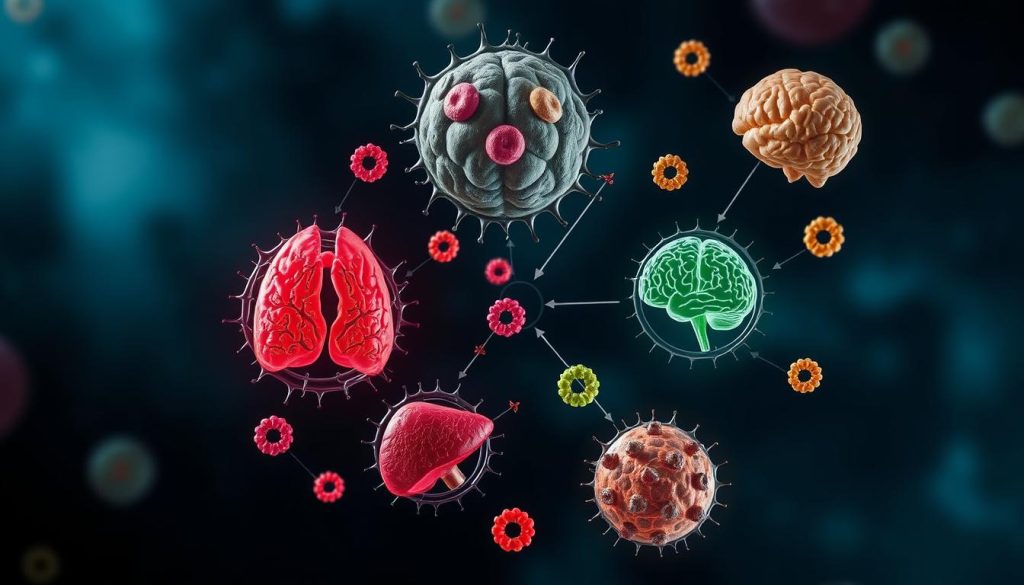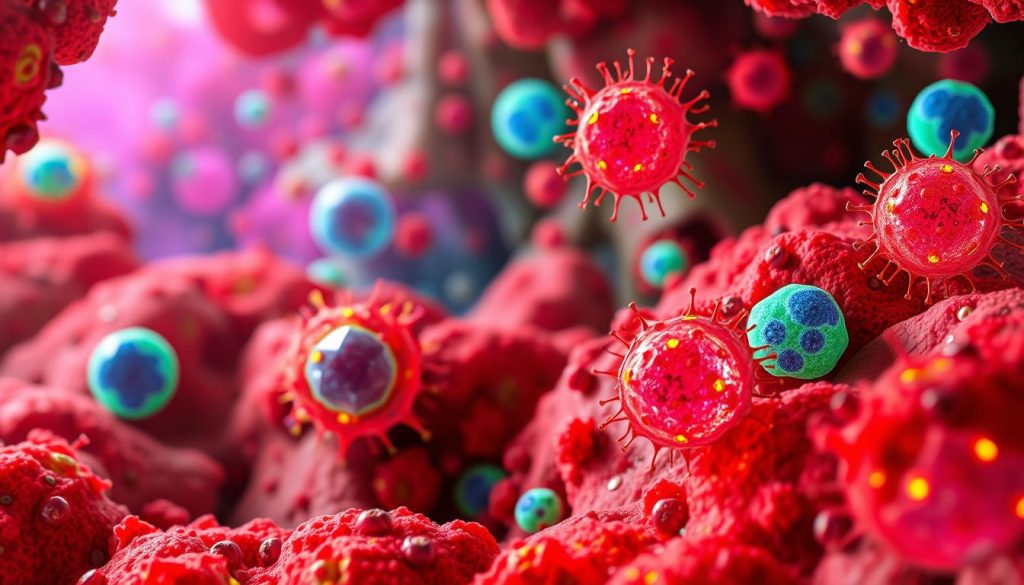Metastatic cancer, also known as advanced cancer or stage IV cancer, is a tough challenge. It happens when cancer cells spread to other parts of the body. This creates new tumors.
We will look into how cancer spreads and the latest ways to diagnose and treat it. Our aim is to help those dealing with advanced cancer and the doctors who care for them.
In this guide, we’ll explore stage IV cancer in detail. We’ll talk about how it progresses and the newest treatments. Knowing more about metastatic cancer helps patients and their families make better choices about care.
What is Metastatic Cancer: Definition and Basic Concepts
Metastatic cancer is when cancer cells move from their first place to other parts of the body. This is called tumor metastasis. It’s a key part of cancer getting worse. Knowing how cancer spreads helps patients and their families understand treatment and what to expect.
The Process of Cancer Cell Spread
Cancer starts when cells break off from the main tumor. These cells travel through blood or lymph, reaching other organs. There, they grow into new tumors, or secondary cancer sites. But many cells don’t make it, facing many challenges.
Primary vs Secondary Cancer Sites
The first tumor is the primary site. New growths in other places are secondary sites. For instance, breast cancer in the lungs is breast cancer, not lung cancer. Doctors treat both primary and secondary sites.
Common Areas Where Cancer Metastasizes
Cancer can go anywhere, but some places are more common. The lungs, liver, bones, and brain are often where it spreads. The type of cancer affects where it goes. Knowing this helps find and treat secondary cancer early.
Early Warning Signs and Symptoms of Cancer Spread
Spotting the early signs of metastatic disease can be tough. But it’s key for quick action. The symptoms of advanced cancer depend on where it spreads. Yet, some common signs are present.
Unexplained weight loss is a common early sign. If you’re losing weight without trying, see your doctor. Persistent pain, like in bones or the abdomen, also hints at cancer spread.
Other symptoms of advanced cancer include:
- Fatigue that doesn’t improve with rest
- Shortness of breath or trouble breathing
- Changes in appetite or digestive issues
- Neurological symptoms like headaches or seizures
- Skin changes or new growths
Remember, these symptoms can have many causes, not just cancer. Regular check-ups and talking openly with your doctor are vital. They help catch problems early.
If you have any ongoing or worrying symptoms, get medical help right away. Catching cancer early can greatly improve treatment options and outcomes.
How Stage IV Cancer Develops and Progresses
Stage IV cancer is the most advanced stage. It has spread to distant parts of the body. Knowing how cancer reaches this stage helps patients and caregivers make better treatment choices.
Staging Systems Explained
Doctors use staging systems to describe cancer’s extent. The TNM system is common. It stands for tumor size, lymph node involvement, and metastasis. Stage IV cancer usually means the cancer has spread to other organs.
Diagnostic Methods for Advanced Cancer
Detecting stage IV cancer involves various tests:
- Imaging scans (CT, PET, MRI)
- Blood tests for tumor markers
- Biopsies of suspected metastatic sites
Timeline of Disease Progression
Cancer progression varies widely among individuals. Some cancers advance quickly, while others grow slowly over years. Early detection and treatment can significantly impact the timeline of cancer progression.
| Stage | Description | Typical Timeline |
|---|---|---|
| I | Small, localized tumor | Months to years |
| II | Larger tumor or limited spread | Months to years |
| III | Spread to nearby tissues | Weeks to months |
| IV | Distant metastasis | Weeks to months |
While stage IV cancer is serious, advances in treatment continue to improve outcomes and quality of life for many patients.
Common Types of Metastatic Disease

Metastatic carcinoma can start from different primary cancer sites. Knowing the common types helps patients and caregivers understand treatment and prognosis. Let’s look at some common forms of this advanced disease.
Breast cancer often goes to bones, liver, lungs, and brain. Women with metastatic breast cancer might feel bone pain, have trouble breathing, or notice neurological symptoms. Lung cancer usually spreads to the brain, bones, liver, and adrenal glands. Patients might have headaches, bone pain, or unexplained weight loss.
Colorectal cancer often goes to the liver and lungs. Symptoms can include abdominal pain, jaundice, or shortness of breath. Prostate cancer usually spreads to bones, causing pain and fractures. These types of metastatic cancer present unique challenges in treatment and management.
| Primary Cancer | Common Metastasis Sites | Potential Symptoms |
|---|---|---|
| Breast | Bones, liver, lungs, brain | Bone pain, breathing issues, neurological changes |
| Lung | Brain, bones, liver, adrenal glands | Headaches, bone pain, weight loss |
| Colorectal | Liver, lungs | Abdominal pain, jaundice, shortness of breath |
| Prostate | Bones | Bone pain, fractures |
Each type of metastatic carcinoma needs a specific treatment plan. This plan considers the primary cancer site and how far it has spread. Early detection and personalized care plans are key to managing these complex cases well.
Advanced Diagnostic Technologies and Testing
Getting a cancer diagnosis right is key to good treatment plans. New tech in metastatic cancer testing gives doctors and patients better info on the disease.
Imaging Techniques for Detection
New imaging methods can spot cancer spread in great detail. These include:
- PET-CT scans
- High-resolution MRI
- Advanced ultrasound
These tools help doctors find small tumors and track how cancer grows.
Blood Tests and Biomarkers
Simple blood tests can show signs of cancer. Biomarkers in the blood tell us about:
- Cancer type
- Disease stage
- Treatment response
These tests are less invasive and easier for patients to get.
Biopsy Procedures
Doctors use special biopsies to get tissue samples. These include:
| Biopsy Type | Description | Best For |
|---|---|---|
| Fine-needle aspiration | Uses thin needle to extract cells | Breast, thyroid lumps |
| Core needle biopsy | Removes small tissue cylinder | Liver, lung masses |
| Liquid biopsy | Analyzes cancer DNA in blood | Monitoring treatment response |
These advanced tools help doctors understand cancer spread. They guide treatment plans and improve patient care.
Treatment Approaches for Secondary Cancer
Metastatic cancer treatment has changed a lot in recent years. Doctors now use many ways to fight secondary cancer and help patients. These methods aim to slow cancer growth, ease symptoms, and increase life expectancy.

Systemic Therapies
Systemic therapies are key in treating metastatic cancer. These treatments go all over the body to find and attack cancer cells. Common ones include:
- Chemotherapy: Powerful drugs that kill fast-growing cells
- Hormone therapy: Blocks or lowers hormones that help some cancers grow
- Precision medicine: Treatments made just for your tumor’s genetic makeup
Targeted Treatments
Targeted treatments aim at specific changes in cancer cells. They are often more precise than traditional chemotherapy, leading to fewer side effects. These treatments target proteins or genes that help cancer grow.
Immunotherapy Options
Immunotherapy is a big step forward in treating metastatic cancer. It helps your body’s immune system fight cancer cells. Types include checkpoint inhibitors, CAR T-cell therapy, and cancer vaccines. These can work even when other treatments fail.
Your oncologist will make a treatment plan just for you. It will depend on your cancer type, stage, and health. Mixing different treatments often gives the best results against metastatic cancer.
Managing Pain and Side Effects
Living with metastatic cancer means dealing with pain and side effects from treatment. It’s key to manage cancer pain well to keep quality of life high. Pain can come from tumors pressing on nerves or organs. Treatment side effects can be mild or severe.
Side effects like fatigue, nausea, and loss of appetite are common. Doctors might give anti-nausea meds or suggest diet changes. Gentle exercise and rest help with fatigue.
For pain, a mix of meds, physical therapy, and relaxation works well. Nutritional support is also key. Eating a balanced diet with plenty of protein helps keep strength up during treatment. Ginger tea or eating small meals often can help with nausea.
Talking openly with your healthcare team about any discomfort or side effects is vital. This way, they can adjust your treatment plan to better suit you.
| Side Effect | Management Strategy |
|---|---|
| Pain | Medications, physical therapy, relaxation techniques |
| Nausea | Anti-nausea drugs, ginger tea, small frequent meals |
| Fatigue | Gentle exercise, proper rest, balanced diet |
Every person’s battle with cancer and its treatments is different. Work with your medical team to create a plan for managing pain and side effects. With the right strategy, many find relief and better quality of life on their cancer journey.
Latest Innovations in Tumor Metastasis Research
Cancer research is moving fast, giving hope to those with metastatic disease. Scientists are finding new ways to fight cancer spread. This leads to innovative treatments that could change patient outcomes.
Clinical Trials and Emerging Treatments
Clinical trials are testing new ways to stop cancer spread. They include targeted therapies and immunotherapies. These aim to attack cancer cells and boost the body’s defenses.
Many trials are looking at combining treatments. This could make treatments more effective and reduce side effects.
Breakthrough Therapies
Recent research has led to exciting new treatments. CAR T-cell therapy, for example, reprograms immune cells to fight cancer. It has shown promise in blood cancers.
Liquid biopsies are another breakthrough. They allow doctors to detect and monitor cancer through simple blood tests. This could help catch cancer spread earlier.
| Breakthrough Therapy | Type of Cancer | Potential Benefit |
|---|---|---|
| CAR T-cell Therapy | Blood Cancers | Improved remission rates |
| Liquid Biopsies | Various | Earlier detection of spread |
| PARP Inhibitors | Ovarian, Breast | Targeted DNA repair blocking |
Future Treatment Directions
The future of metastatic cancer treatment looks bright. Researchers are working on personalized vaccines and nanotechnology for drug delivery. They’re also using artificial intelligence to predict cancer spread.
These new treatments aim to be more effective and less toxic. They offer hope for patients with advanced disease.

As cancer research advances, patients with metastatic disease have more reasons to be hopeful. New treatments are emerging. They may extend life and improve quality of life for those with advanced cancer.
Quality of Life with Metastatic Carcinoma
Living with metastatic cancer has its challenges, but a good quality of life is possible. Patients can use strategies to keep their physical and emotional health up. They can also manage their condition well.
Exercise is key for a good quality of life with cancer. Activities like walking or yoga can increase energy and improve mood. Eating a balanced diet is also important. It helps keep health up and makes treatments work better.
Mental health support is essential for those with metastatic cancer. Counseling, support groups, and mindfulness can help with stress and anxiety. Setting realistic goals and finding joy in daily activities can give a sense of purpose and happiness.
| Quality of Life Aspect | Strategies |
|---|---|
| Physical Well-being | Regular gentle exercise, balanced nutrition, adequate rest |
| Emotional Health | Counseling, support groups, mindfulness practices |
| Daily Living | Setting achievable goals, engaging in enjoyable activities |
| Social Connections | Maintaining relationships, joining cancer support communities |
By focusing on these areas, people can improve their quality of life with cancer. It’s important to work with healthcare providers. They can help tailor these strategies to fit individual needs and treatment plans.
Support Systems and Resources for Patients
Facing metastatic cancer can feel overwhelming. But, you don’t have to face it alone. A strong network of cancer support and patient resources can make a big difference in your journey.
Finding the Right Medical Team
Your medical team is key to your treatment plan. Look for doctors who specialize in your cancer type and have experience with metastatic cases. If you feel your needs aren’t being met, don’t hesitate to seek second opinions or switch providers.
Support Groups and Counseling
Connecting with others who understand your experience can be very comforting. Many hospitals and community centers offer cancer support groups. Online forums and virtual meetups are also great options. Professional counseling can help you cope with the emotional challenges of your diagnosis.
Financial Resources
Cancer treatment can be expensive, but there are resources to help. Check with your hospital’s social work department for financial assistance programs. Many pharmaceutical companies offer patient assistance programs for medication costs. Don’t forget to explore government programs and nonprofit organizations that provide financial support for cancer patients.
- American Cancer Society: Offers a range of support services and resources
- CancerCare: Provides counseling, support groups, and financial assistance
- Patient Advocate Foundation: Helps with insurance issues and financial aid
Remember, reaching out for help is a sign of strength, not weakness. With the right support system and resources, you can face the challenges of metastatic cancer with courage and hope.
Palliative Care Options and Benefits
Palliative care is a key part of advanced cancer care. It aims to improve life quality for those with serious illnesses. It tackles physical symptoms, emotional needs, and spiritual concerns.
Palliative care teams work with oncologists to offer full support. They manage pain, nausea, and fatigue from cancer treatments. They also provide counseling and help with tough decisions.
Many think palliative care is only for the end of life. But it’s helpful at any illness stage. Starting palliative care early can lead to better results and happier patients.
Benefits of palliative care include:
- Enhanced pain and symptom management
- Improved communication between patients, families, and healthcare providers
- Reduced hospital stays and emergency room visits
- Better emotional support for patients and caregivers
- Assistance with advance care planning
Palliative care is available in hospitals, clinics, and at home. This makes it easy for patients to get care where they feel most comfortable.
Many insurances cover palliative care, making it available to many. As more people learn about it, healthcare systems are adding it to their treatment plans for advanced cancer.
Integrative and Complementary Therapies
Integrative oncology mixes traditional cancer treatments with proven complementary therapies. It aims to boost well-being and quality of life for those with cancer.
Alternative Medicine Approaches
Many cancer patients try complementary cancer therapies to manage symptoms and improve health. These include acupuncture, massage, and meditation. It’s important to talk to your healthcare team about these options to make sure they are safe and work well.
Lifestyle Modifications
Integrative oncology focuses on lifestyle changes that help with cancer treatment and recovery. These changes often include:
- Regular exercise tailored to individual abilities
- Stress reduction techniques like yoga or tai chi
- Adequate sleep and rest
- Smoking cessation and limiting alcohol intake
Nutritional Support
Good nutrition is key in cancer care. A balanced diet can help manage side effects and improve health. Some nutritional strategies in integrative oncology include:
| Strategy | Benefits |
|---|---|
| Plant-based diet | Rich in antioxidants and anti-inflammatory compounds |
| Omega-3 fatty acids | May reduce inflammation and support immune function |
| Probiotics | Can improve gut health and boost immunity |

Integrative oncology looks at the whole person, not just the disease. By mixing traditional treatments with complementary therapies, patients may see better quality of life and treatment results. Always check with your oncology team before starting any new therapies or making big lifestyle changes.
Living with Advanced Cancer: Daily Management Strategies
Coping with metastatic cancer means focusing on daily strategies. These help patients deal with advanced cancer while keeping a sense of normalcy and control.
Energy conservation is key for those with metastatic cancer. Fatigue is common, so it’s important to choose activities wisely and pace oneself. A balanced schedule with rest periods helps keep energy up.
Stress management is also vital. Deep breathing, meditation, or gentle yoga can lower anxiety and help relax. Many find these practices good for both body and mind.
Keeping relationships strong is important too. Talking openly with loved ones about needs and feelings can build support. Joining support groups helps connect with others facing similar challenges.
| Daily Management Strategy | Benefits |
|---|---|
| Energy Conservation | Reduces fatigue, improves quality of life |
| Stress Management | Lowers anxiety, enhances emotional well-being |
| Maintaining Relationships | Strengthens support system, reduces isolation |
By using these strategies, patients can actively manage their care. They can live fully despite their diagnosis. Good cancer management looks at both physical and emotional needs.
Hope and Resilience in the Face of Metastatic Cancer
Living with metastatic cancer is a journey with ups and downs. Many patients find inner strength and resilience along the way. Cancer survivorship stories inspire hope and show that life can be meaningful, even in challenging times.
Take Sarah, a 45-year-old teacher diagnosed with stage IV breast cancer. She continued working part-time and started a support group for other patients. Her story of determination touched many lives. Another inspiring example is Mark, who hiked the Appalachian Trail after his metastatic lung cancer diagnosis, proving that personal goals can be achieved.
These metastatic cancer stories remind us that each person’s journey is unique. Some find purpose through advocacy, while others focus on spending quality time with loved ones. Setting personal goals, no matter how small, can bring a sense of accomplishment and joy. Remember, there’s no single right way to navigate this path – what matters most is finding meaning that resonates with you.
FAQ
Q: What is metastatic cancer?
A: Metastatic cancer, also known as stage IV cancer, happens when cancer cells spread to other parts of the body. This is called metastasis. It creates new tumors in distant organs or tissues.
Q: How does cancer spread to other parts of the body?
A: Cancer spreads through the bloodstream or lymphatic system. Cancer cells break away from the main tumor. They travel through these systems and settle in new places to form secondary tumors.
Q: What are common sites of metastasis?
A: Common places for metastasis include the lungs, liver, bones, and brain. But, the exact places can vary based on the type of cancer.
Q: What are the early warning signs of metastatic cancer?
A: Early signs might include unexplained weight loss, persistent pain, and fatigue. Organ-specific symptoms can also occur. Regular check-ups and talking to your healthcare provider are key.
Q: How is metastatic cancer diagnosed?
A: Diagnosis uses imaging techniques like CT scans, MRIs, or PET scans. Blood tests for biomarkers and biopsy procedures are also used. The tests depend on the suspected type and location of metastasis.
Q: What treatment options are available for metastatic cancer?
A: Treatments include systemic therapies like chemotherapy or hormone therapy. Targeted treatments, immunotherapy, radiation therapy, and sometimes surgery are also options. The treatment plan is tailored to the patient’s needs and cancer type.
Q: Is metastatic cancer always terminal?
A: Metastatic cancer is often serious, but it’s not always terminal. Advances in treatment have improved outcomes for many patients. Each case is different, and prognosis depends on various factors.
Q: What is palliative care, and how does it relate to metastatic cancer treatment?
A: Palliative care improves quality of life for patients with serious illnesses like metastatic cancer. It can be given alongside treatments to manage symptoms, pain, and emotional stress.
Q: Are there clinical trials available for metastatic cancer patients?
A: Yes, many clinical trials are available for metastatic cancer. These trials test new treatments or combinations of existing therapies. Patients should talk to their oncology team about trial options.
Q: How can I maintain my quality of life while living with metastatic cancer?
A: To maintain quality of life, focus on managing pain and symptoms, staying nutritionally balanced, exercising, and taking care of your mental health. Engaging in meaningful activities is also important. Support groups and counseling can help too.
Q: What support resources are available for metastatic cancer patients and their families?
A: Resources include support groups, counseling services, financial assistance, and educational materials from cancer organizations. Many hospitals offer patient navigator services to help with care and resources.
Q: Can complementary therapies help in managing metastatic cancer?
A: Complementary therapies like acupuncture, meditation, or yoga may help manage symptoms and improve well-being. But, it’s important to talk to your oncology team first to make sure they won’t interfere with your treatment.


















